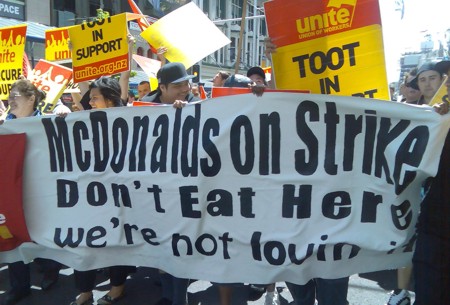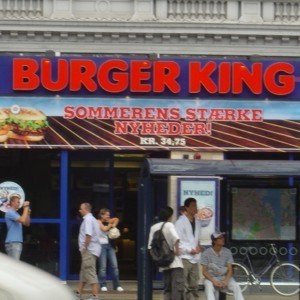We’ve posted in this space before on contentious issues in the employment practices of the Fast Food Industry. There have been issues about using ‘temporary’ foreign workers and almost universal complaints from workers that their wages aren’t livable. Now, a Danish outfit is challenging the norm, as it were, and reaping some unsuspected benefits…
 McDonald’s workers on strike for higher wages.
McDonald’s workers on strike for higher wages.
The Danish holding company that operates most of that country’s Burger King and Starbucks’s shops pays the bulk of its full-time employees the equivalent of $20 an hour. That’s $5 more than the $15 that many fast food workers elsewhere in the world are fighting for. And $11 more than at least one McDonald’s shift leader in Tamps. FL, who makes $9 an hour, works around 36 hours a week and takes home a mere $300 a month.Thanks to a national collective agreement covering fast food workers, they also get benefits including five weeks’ paid vacation, paid maternity and paternity leave and a pension plan. Also, they must be paid extra for working after 6 p.m. and on Sundays.
Yet, a Big Mac costs less than a dollar more in Denmark than it does in the U.S.
All this according to a recent rather shocking story in The New York Times.
So, how do they manage to keep the shareholders happy in Denmark? First of all, we’re told that the standard of living inn Denmark is relatively high and the cost of living is correspondingly higher than that in many parts of North America or other parts of the world. people are used to paying more for restaurant food, entertainment and ‘luxuries’ in general.
Also, 70 percent of the workers at Danish Burger King and Starbuck’s franchises stay for more than a year, compared to a mere 8 months tenure for workers at the same franchises in the U.S. That represents a significant saving is training, enrollment and other costs associated with employee turnover.
Finally, Martin Drescher, General Manager of HMSHost Denmark, the holding company, notes that cost and other factors are different in Denmark than that are elsewhere.
“We have to acknowledge it’s more expensive to operate,” he says. “But we can still make money out of it — and McDonald’s does, too. Otherwise, it wouldn’t be in Denmark.”
And… Drescher adds:
“The company doesn’t get as much profit, but the profit is shared a little differently.”
Fast Food Moguls elsewhere take note!
~ Maggie J.

